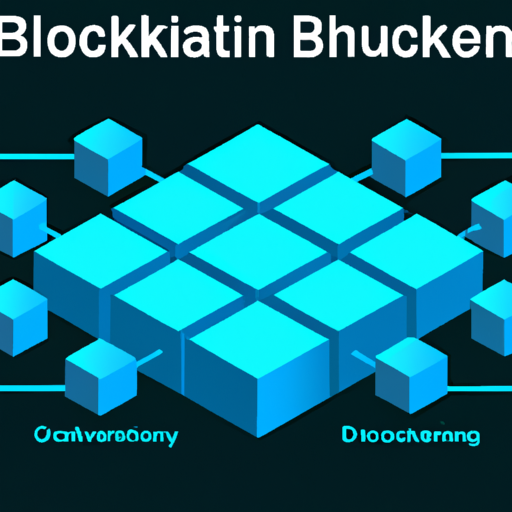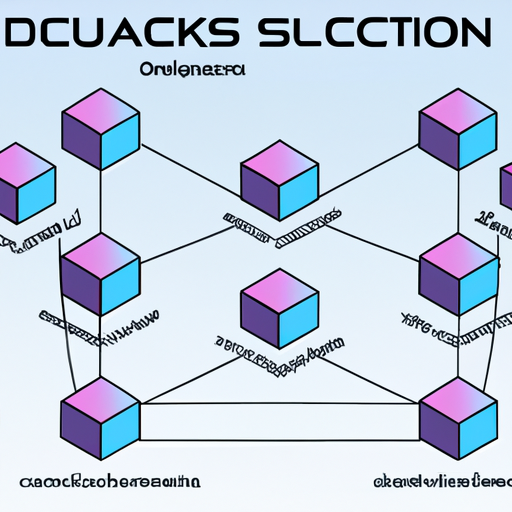-
Table of Contents
- Introduction
- The Future of Cryptocurrencies and Their Impact on the Global Economy
- The Role of Governments in Regulating and Adopting Blockchain Technology
- The Impact of Blockchain Technology on Businesses and Industries
- Exploring the Potential of Blockchain Technology for Social Good
- How Blockchain Technology Could Revolutionize the Financial System
- Conclusion
“Unlock the Future: Harnessing the Power of Blockchain to Transform the Economy and Society.”
Introduction
The blockchain technology has been gaining a lot of attention in recent years due to its potential to revolutionize the way we do business and interact with each other. Blockchain technology is a distributed ledger system that allows for secure and transparent transactions without the need for a third-party intermediary. This technology has the potential to revolutionize the way we do business, interact with each other, and even how we govern ourselves. It has the potential to create a more secure, efficient, and transparent economy and society. In this article, we will explore the potential impact of blockchain technology on the economy and society, and what the future of blockchain technology may hold.
The Future of Cryptocurrencies and Their Impact on the Global Economy
Cryptocurrencies have become increasingly popular in recent years, and their impact on the global economy is likely to be significant. Cryptocurrencies are digital assets that use cryptography to secure and verify transactions, and they are decentralized, meaning they are not controlled by any single entity. This makes them attractive to investors, as they are not subject to the same regulations as traditional currencies.
The potential of cryptocurrencies to revolutionize the global economy is immense. They could provide a secure and efficient way to transfer money across borders, reducing the cost and time associated with traditional methods. They could also provide a more secure way to store value, as they are not subject to the same risks as traditional currencies. Additionally, cryptocurrencies could provide a platform for new types of financial instruments, such as smart contracts and decentralized applications.
The use of cryptocurrencies could also have a positive impact on the global economy. For example, they could reduce the cost of remittances, making it easier for people to send money to family and friends in other countries. They could also reduce the cost of international trade, as transactions would be faster and more secure. Additionally, cryptocurrencies could provide a platform for new types of investments, such as Initial Coin Offerings (ICOs).
Despite the potential of cryptocurrencies to revolutionize the global economy, there are still many challenges that need to be addressed. For example, there is still a lack of regulation in the cryptocurrency market, which could lead to fraud and manipulation. Additionally, there is still a lack of understanding of the technology, which could lead to confusion and mistrust. Finally, there is still a lack of infrastructure to support the use of cryptocurrencies, such as exchanges and payment processors.
In conclusion, cryptocurrencies have the potential to revolutionize the global economy, but there are still many challenges that need to be addressed. If these challenges can be overcome, cryptocurrencies could provide a secure and efficient way to transfer money across borders, reduce the cost of remittances, and provide a platform for new types of investments. As such, the future of cryptocurrencies and their impact on the global economy is likely to be significant.
The Role of Governments in Regulating and Adopting Blockchain Technology
The emergence of blockchain technology has revolutionized the way we think about data storage and security. Governments around the world are now recognizing the potential of this technology and are beginning to explore ways to regulate and adopt it.
Blockchain technology is a distributed ledger system that records and stores data in a secure and immutable manner. It is decentralized, meaning that it is not controlled by any single entity, and it is highly secure, making it difficult for hackers to access or alter data. This makes it an attractive option for governments, as it can be used to store sensitive information and ensure its integrity.
Governments have a responsibility to ensure that blockchain technology is used responsibly and ethically. To do this, they must create regulations that protect users and ensure that the technology is used for legitimate purposes. Governments must also ensure that the technology is secure and that data is not vulnerable to manipulation or theft.
In addition to regulating the use of blockchain technology, governments must also consider how to adopt it. Governments can use blockchain technology to improve the efficiency of their operations, reduce costs, and increase transparency. For example, governments can use blockchain to store and manage records, such as birth certificates, land titles, and tax records. This can help reduce paperwork and streamline processes.
Governments can also use blockchain technology to improve the security of their systems. By using blockchain, governments can ensure that data is secure and that it cannot be manipulated or stolen. This can help protect citizens’ data and ensure that government systems are secure.
Finally, governments must consider how to use blockchain technology to promote economic growth. Blockchain can be used to facilitate financial transactions, create new markets, and enable new business models. This can help create jobs and stimulate economic growth.
In conclusion, governments have an important role to play in regulating and adopting blockchain technology. They must create regulations to protect users and ensure that the technology is used responsibly. They must also consider how to use blockchain to improve the efficiency of their operations, reduce costs, and increase transparency. Finally, they must explore ways to use blockchain to promote economic growth.
The Impact of Blockchain Technology on Businesses and Industries
Blockchain technology has revolutionized the way businesses and industries operate. It is a distributed ledger technology that enables secure, transparent, and immutable transactions. It has the potential to revolutionize the way businesses and industries interact with each other, as well as how they store and manage data.
The most significant impact of blockchain technology on businesses and industries is its ability to provide secure and transparent transactions. By using blockchain technology, businesses and industries can ensure that all transactions are secure and transparent. This is because the data stored on the blockchain is immutable, meaning that it cannot be changed or tampered with. This makes it difficult for hackers to access sensitive information, as well as for malicious actors to manipulate the data.
Another major impact of blockchain technology on businesses and industries is its ability to reduce costs. By using blockchain technology, businesses and industries can reduce the cost of transactions, as well as the cost of storing and managing data. This is because blockchain technology eliminates the need for third-party intermediaries, such as banks and other financial institutions. This reduces the cost of transactions, as well as the cost of storing and managing data.
Finally, blockchain technology has the potential to revolutionize the way businesses and industries interact with each other. By using blockchain technology, businesses and industries can securely and transparently exchange data and assets. This can help to reduce the cost of transactions, as well as the cost of storing and managing data. Additionally, it can help to reduce the risk of fraud and other malicious activities.
In conclusion, blockchain technology has the potential to revolutionize the way businesses and industries operate. It can provide secure and transparent transactions, reduce costs, and revolutionize the way businesses and industries interact with each other. As such, it is clear that blockchain technology has the potential to revolutionize the way businesses and industries operate.
Exploring the Potential of Blockchain Technology for Social Good
Blockchain technology has the potential to revolutionize the way we interact with each other and with the world around us. By providing a secure, distributed ledger system, blockchain technology can enable more efficient and transparent transactions, as well as provide a platform for new applications and services. This technology has the potential to be used for social good, providing a secure and transparent way to facilitate transactions and interactions between individuals, organizations, and governments.
At its core, blockchain technology is a distributed ledger system that records and stores data in a secure and immutable manner. This data is stored in a decentralized network of computers, which allows for secure and transparent transactions. This technology is also resistant to tampering and manipulation, making it an ideal platform for secure transactions.
One of the most promising applications of blockchain technology for social good is in the area of financial transactions. By providing a secure and transparent platform for financial transactions, blockchain technology can help reduce the cost of financial services and increase access to financial services for those who are underserved. This technology can also be used to facilitate the transfer of funds between individuals, organizations, and governments, allowing for more efficient and secure transactions.
In addition to financial transactions, blockchain technology can also be used to facilitate the exchange of data and information. By providing a secure and transparent platform for data exchange, blockchain technology can help reduce the cost of data storage and increase access to data for those who are underserved. This technology can also be used to facilitate the exchange of information between individuals, organizations, and governments, allowing for more efficient and secure data exchange.
Finally, blockchain technology can also be used to facilitate the development of new applications and services. By providing a secure and transparent platform for the development of new applications and services, blockchain technology can help reduce the cost of development and increase access to new applications and services for those who are underserved. This technology can also be used to facilitate the development of new applications and services between individuals, organizations, and governments, allowing for more efficient and secure development.
In conclusion, blockchain technology has the potential to revolutionize the way we interact with each other and with the world around us. By providing a secure, distributed ledger system, blockchain technology can enable more efficient and transparent transactions, as well as provide a platform for new applications and services. This technology has the potential to be used for social good, providing a secure and transparent way to facilitate transactions and interactions between individuals, organizations, and governments.
How Blockchain Technology Could Revolutionize the Financial System
Blockchain technology has the potential to revolutionize the financial system as we know it. Blockchain is a distributed ledger technology that allows for secure, transparent, and immutable transactions. It is a decentralized system that is not controlled by any single entity, making it resistant to manipulation and fraud.
Blockchain technology has the potential to revolutionize the way financial transactions are conducted. By using a distributed ledger, transactions can be securely recorded and verified in real-time. This eliminates the need for a third-party intermediary, such as a bank or other financial institution, to facilitate the transaction. This could reduce costs and increase efficiency in the financial system.
In addition, blockchain technology could also help to reduce fraud and money laundering. By using a distributed ledger, all transactions are recorded and verified in real-time. This makes it difficult for criminals to hide their activities or manipulate the system. Furthermore, blockchain technology could also help to reduce the risk of identity theft by providing a secure and immutable record of all transactions.
Finally, blockchain technology could also help to improve access to financial services. By using a distributed ledger, financial services can be provided to anyone with an internet connection. This could help to reduce the cost of providing financial services to those in developing countries or those who are unbanked.
Overall, blockchain technology has the potential to revolutionize the financial system. By providing secure, transparent, and immutable transactions, it could reduce costs, reduce fraud, and improve access to financial services. As the technology continues to develop, it is likely that it will become an integral part of the financial system.
Conclusion
The future of blockchain technology is bright and its potential impact on the economy and society is immense. Blockchain technology has the potential to revolutionize the way we do business, store data, and interact with each other. It can provide a secure, transparent, and efficient platform for transactions and data storage, and can help to reduce costs and increase efficiency. As the technology continues to evolve, its potential applications and implications for the economy and society will become more apparent. With the right investments and support, blockchain technology could be a major force for positive change in the world.




